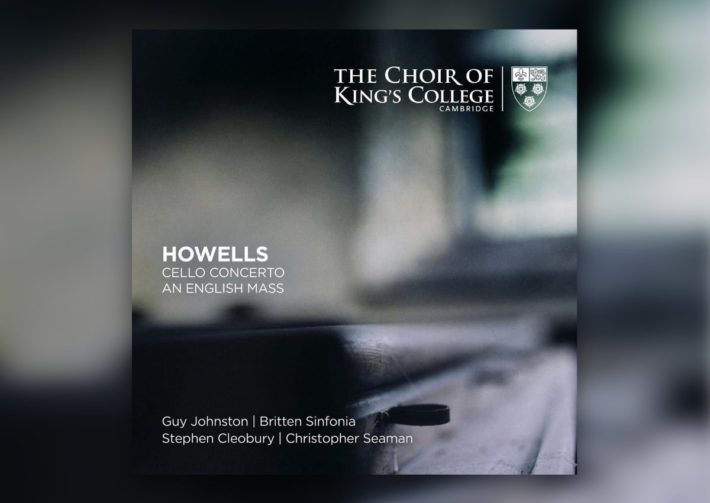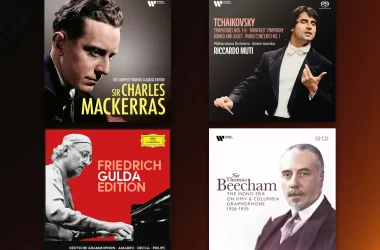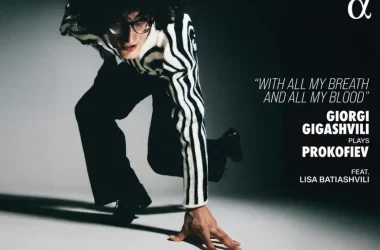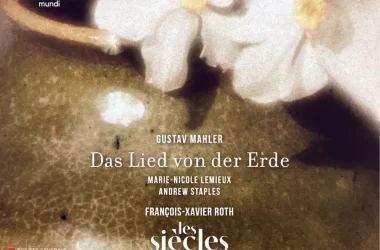The English composer Herbert Howells (1892-1983), a contemporary of Gustav Holst and Ralph Vaughan Williams, is known in the U.K. chiefly as a composer of Anglican choral music and organ pieces. However, there is far more to Howells, as this new recording showcases. The double album highlights two aspects of his substantial output, his church music and orchestral œuvre.
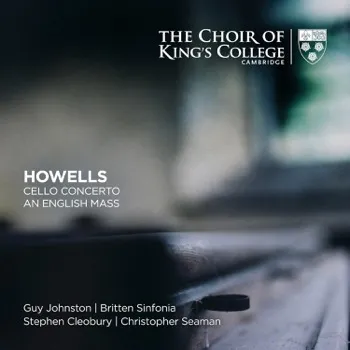
The choral works are conducted by The Choir of King’s College, Cambridge’s long-standing director, the recently knighted Stephen Cleobury, who also directs the Britten Sinfonia. Cleobury, who is the President of the Herbert Howells Society and knew the composer, brings an authority to the choral and organ works on this release. For the Cello Concerto on the second CD, the baton is passed to Christopher Seaman. All the works presented here were recorded in a place Howells knew intimately — the Chapel of King’s College, Cambridge. This grand church acoustic allows “An English Mass” to be heard in the context in which the composer conceived it.
The first work, “Te Deum”, owes much to the influence of Vaughan Williams. It was first performed in 1944 for this choir and intended for performance in the same surroundings as this recording. For this version, the modest forces of the all-male King’s Choir are supplemented by the mixed choir of the King’s Singers. It’s a bold piece that also bellies some fine melodic moments. Both choirs sing with good diction, and the boy choristers have a particularly pleasing tone, but they are unfortunately overshadowed on occasion by the orchestra.
“An English Mass”, composed in 1955, shows Howells in a more mature light. The version used here benefits from the inclusion of the optional woodwind, timpani and harp in addition to strings and organ, and is a fine account with a judicious balance. The world-famous organ of the chapel is treated sensitively, sympathetically captured within the context of the choral and orchestral lines, allowing listeners to get a sense of the grandeur of the recording venue.
Howells’ Cello Concerto and Organ Works
Howells’ cello concerto received its premiere in 2016 by Guy Johnston, more than 20 years after the composer’s death. The work’s last two movements existed only as sketches, but the first movement was fully orchestrated by the composer. This work is very different from the vocal pieces, darker and more introspective. Guy Johnston (cello) plays with absolute assurance, bringing out the multilayered emotions of this melancholic piece. In the slow movement, there are segments of utter restraint and tenderness. Neither the composer nor Johntson get overly dramatic, striking a sensitive balance to convey the tremendous sadness depicted in this work. This time, the acoustics of the King’s Chapel is far less intrusive, the cello is situated appropriately and there is a natural perspective in the placing of the harp and woodwind.
Closing the album are three contrasting pieces for organ, played by Cleobury, showcasing the fine instrument of the King’s College Chapel. “Paean” is a forward-looking composition, whilst ״Master Tallis’s Testament״ — with its strong echoes of Vaughan Williams, harks back to the golden age of English music. Both works are expertly voiced and played with a real sense of solemnity. The “Rhapsody No.3” is modal in character, more typical of some of Howells other music. Cleobury brings the album to a fitting conclusion in these refined performances.
The booklet disappointingly omits the sung texts, but does contain extensive notes written by two authorities of English music; the conductor Paul Spicer and musicologist Jonathan Clinch. Both provide a commentary into the contexts of the compositions and approachable analysis
Those wishing to explore Howell’s music further should try two albums of his other works; Not the obvious work, the Hymnus Paradisi, but the Requiem, performed by the Choir of Trinity College Cambridge conducted by Stephen Layton (Hyperion, Amazon), who gives a moving rendition of this reflective masterpiece. The other, the composer’s two piano concertos, can be heard played persuasively by Howard Shelly with the BBC Symphony Orchestra under the late Richard Hickox.
Herbert Howells – an English Mass, Te Deum and Magnificat ‘Collegium Regale’, Cello Concerto, Organ Works
Guy Johnston – Cello
The Choir of King’s College, Cambridge
Britten Sinfonia
Christopher Seaman – Conductor (Concerto)
Stephen Cleobury – Conductor, Organ
The King’s College, Cambridge label, CD KGS0032-D


